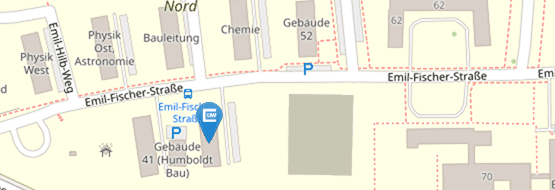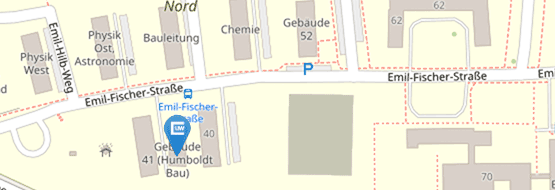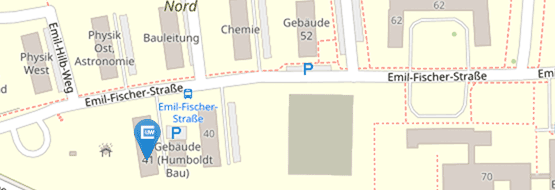Qualification targets Bachelor Mathematical Physics (180 ECTS)
The aim of this degree programme is to familiarise students with the most important sub-areas of mathematical physics, to familiarise them with the methods of mathematical and physical thinking and working as well as the interdisciplinary application possibilities of physical-mathematical methods.
Through their education and through the training of analytical thinking, the students acquire the ability to later familiarise themselves with the diverse fields of tasks that are assigned to them and, in particular, to acquire the basic knowledge required for a consecutive Master's degree programme.
Therefore, emphasis is placed on the understanding of fundamental mathematical and physical concepts, laws and ways of thinking as well as a sound knowledge of physical-mathematical methods and the development of analytical analytical thinking, the ability to think abstractly and the ability to structure complex contexts are more important than the most comprehensive detailed knowledge possible in mathematics and physics.
Scientific qualification
| Qualification target | Implementation | Target achievement |
|---|---|---|
| Graduates are familiar with the working methods and the associated technical language of mathematics and have mastered the methods of mathematical thinking and proof. | Basic mathematical concepts and proof methods, argumentation and writing in mathematics, mandatory modules in analysis and linear algebra | Exercises in small groups, mandatory exercises, written examinations, individual oral examinations |
| Graduates possess knowledge of the mathematical foundations of theoretical physics and are familiar with the basic proof methods of these fields. | Mandatory elective modules | Exercises, written examinations, individual oral examinations |
| Graduates understand the mathematical, theoretical and experimental foundations of physics and can apply them. | Basic lectures Classical Physics 1 and 2 and exercises, mandatory elective modules | Exercises in small groups, exercises, written examinations, individual oral examinations |
| Graduates can carry out experiments under guidance, analyse them and present and evaluate the results obtained. | Basic practical course | Colloquium, experimental performance, protocols |
| Graduates are able to work on physical problems by applying the scientific working method and observing the rules of good scientific practice (documentation, error analysis). | Modules for error calculation | Exercises and written examination |
| Graduates understand the essential connections and concepts of the individual sub-fields of theoretical physics. | Two-semester modules | Oral examinations, thesis |
| Graduates are able to apply their mathematical skills to physical problems. | Seminar Mathematical Physics, thesis | Presentation, thesis |
| Graduates are trained in analytical thinking, possess a high level of abstraction, universally applicable problem-solving skills and the ability to structure complex contexts. | Lectures with exercises, seminars, thesis | Exercises, written examinations, individual oral examinations, presentations, thesis |
| Graduates are able to independently familiarise themselves with further areas of mathematics and physics with the help of specialist literature. | Seminars, thesis | Presentations, thesis |
| Graduates are able to present their knowledge, ideas and solutions to problems in an understandable way. | Seminars, exercises | Presentations, presentation of the solution of exercises |
| Graduates possess the basic knowledge, ways of thinking and methodological skills required for further, especially Master's, studies in mathematics and physics. | Lectures, tutorials, seminars, basic practical, thesis | Exercises, individual oral examinations, presentations, colloquium, experimental performance, protocols, thesis |
| Graduates know the rules of good scientific practice and are able to observe them in their own work. | Thesis | Thesis |
Ability to take up employment
| Qualification target | Implementation | Target achievement |
|---|---|---|
| Graduates are trained in analytical thinking, possess a high level of abstraction, universally applicable problem-solving skills and the ability to structure complex contexts. | Lectures with exercises, seminar, thesis | Exercises, written examinations, individual oral examinations, presentations, thesis |
| Graduates are able to formulate and present their knowledge, ideas and problem solutions in a target group-oriented and comprehensible manner, also in a foreign language. | Seminars, tutorials, tutoring and proofreading, language courses, ASQ-Pool | Presentations, presentation of the solution of exercises, supervision of an exercise group under guidance |
| Graduates are able to recognise, structure and model concrete problems and develop solutions using mathematical and physical methods. | Lectures and exercises, practical courses, seminar on mathematical physics, thesis | Exercises, experiments and protocols, lectures, thesis |
| Graduates have a strong perseverance in solving complex problems. | Exercises, thesis | Exercises, thesis |
| Graduates are able to access further areas of knowledge independently, efficiently and systematically. | Seminars, thesis | Presentations, thesis |
| Graduates are able to work together constructively and in a goal-oriented manner in a heterogeneous, interdisciplinary team, to use different and divergent views productively to achieve goals and to resolve conflicts that arise (teamwork skills). | Practical course, exercises, seminars, thesis | Group work in exercises and practicals, presentations, thesis |
| Graduates are able to analyse, interpret and present data using statistical methods. | Error calculation modules, practical courses, thesis | Exercises, written examinations, colloquium, experimental performance, protocols, thesis |
Personality development
| Qualification target | Implementation | Target achievement |
|---|---|---|
| Graduates are trained in analytical thinking, possess a high level of abstraction, universally applicable problem-solving skills and the ability to structure complex contexts. | Lectures with exercises, seminar, thesis | Exercises, written examinations, individual oral examinations, presentations, thesis |
| Graduates know the rules of good scientific practice and are able to observe them in their own work. | Thesis | Thesis |
| Graduates are able to critically reflect and evaluate social, economic and historical developments and processes. | Current references in courses, Selected chapters in the history of mathematics, ASQ pool, thesis | Presentations, project work, thesis |
| Graduates develop the willingness and ability to contribute their competences to participatory processes and to actively participate in decision-making. | Involvement in the student council and other student structures, participation in commissions and committees. | Committee work and meetings |
| Graduates have a strong perseverance in solving complex problems. | Exercises, thesis | Exercises, thesis |
| Graduates are able to formulate and present ideas and proposed solutions in a generally understandable way. | Seminars, tutorials, tutoring and proofreading | Presentations, presentation of the solution of exercises, supervision of an exercise group under guidance |





